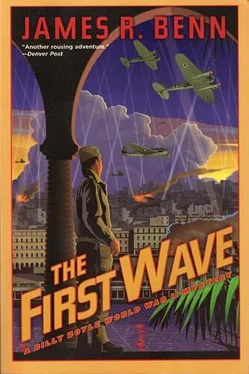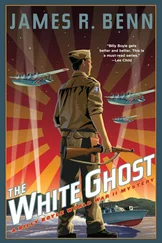James Benn - The First Wave
Здесь есть возможность читать онлайн «James Benn - The First Wave» весь текст электронной книги совершенно бесплатно (целиком полную версию без сокращений). В некоторых случаях можно слушать аудио, скачать через торрент в формате fb2 и присутствует краткое содержание. Жанр: Криминальный детектив, на английском языке. Описание произведения, (предисловие) а так же отзывы посетителей доступны на портале библиотеки ЛибКат.
- Название:The First Wave
- Автор:
- Жанр:
- Год:неизвестен
- ISBN:нет данных
- Рейтинг книги:4 / 5. Голосов: 1
-
Избранное:Добавить в избранное
- Отзывы:
-
Ваша оценка:
- 80
- 1
- 2
- 3
- 4
- 5
The First Wave: краткое содержание, описание и аннотация
Предлагаем к чтению аннотацию, описание, краткое содержание или предисловие (зависит от того, что написал сам автор книги «The First Wave»). Если вы не нашли необходимую информацию о книге — напишите в комментариях, мы постараемся отыскать её.
The First Wave — читать онлайн бесплатно полную книгу (весь текст) целиком
Ниже представлен текст книги, разбитый по страницам. Система сохранения места последней прочитанной страницы, позволяет с удобством читать онлайн бесплатно книгу «The First Wave», без необходимости каждый раз заново искать на чём Вы остановились. Поставьте закладку, и сможете в любой момент перейти на страницу, на которой закончили чтение.
Интервал:
Закладка:
We drove through the city center, which was filled with shops and cafes. This was France, not Algeria. All the signs were in French, and the only Arabs in sight were sweeping the sidewalks. Men in suits walked hurriedly down the streets between the four- and five-story buildings, all richly decorated with ironwork grills and tall windows. People sat under awnings at sidewalk cafes, sipping tiny cups of thick coffee as they watched the world go by. I was the world going by. I had places to go, people to kill, no time for lolling around a cafe. As we drove closer to the water, the road skirted the shore. The buildings to our left, each house painted the same light sea-green color that made them look cool even as they baked in the harsh brightness, had their shutters closed tight against the blazing sun. While I admired the architecture, Kaz had been studying the notebook with the codes in it. Or ciphers, if that's what they were. He tapped his finger on an open page, nodding to himself.
"This has to be a book cipher. It has to be."
"What do you mean?"
"Book cipher, or dictionary code in its simplest form-"
"Well, which is it, a code or a cipher?"
"Both, in a way. Did you know the English word code comes from the Latin codex, which means book? So, actually…"
"Okay, okay, I'm sorry I asked. Just tell me what it means. Is it good news or bad?"
"Oh, very bad indeed, for us. Unless we know which book, then it is very good news."
"Kaz, could you start making sense anytime now? That would be fine."
"Very well. Remember when I told you about the sets of three numbers? For instance, like this set, 236-16-5."
"Yeah."
"I think this is a variation on a dictionary code. With that, two people have the same edition of a dictionary. There are two number sets used, such as 90-25. That means go to page ninety and then the twenty-fifth entry. Therefore, 90-25 stands for that word."
"Okay, but we have three numbers."
"Yes, that is why this is so clever. I am guessing that there is a book, but it is not necessarily a dictionary. It could be anything. And, the third number refers to a letter. Page number, line number, then count to the number indicated and you get one letter."
"Is that safer?"
"Quite. One way to break a code is to look for patterns. The most common letters in the English language are E, T, O, A, and R, in that order. You can look for patterns in codes to see how often certain substitutions are used."
"But with this book code, I could use a different three-number combination for every E in my message!"
"Excellent, Billy! Yes, there need never be a repeat. No pattern, nothing to go on. The only way to break this code, if it is what I think it is, would be to discover what book is being used."
"But only the people using the code know that, and it would be incredibly easy to hide."
"Oh, yes, it could be anything. Even a magazine, if it had enough pages. Or a manual, or a novel, or…" He gave up and shrugged.
"Great. So the codebook is useless."
"Yes. I went through the substitution code, the simple one, and that is all place names. I will check a map later but I doubt anything important was consigned to that code. It's only a shorthand, as I said."
"Well, good work anyway, Kaz. Sure would be nice if we could catch a break for a goddamn change." I hit the horn as an Arab leading a couple of donkeys took more than his share of the road. Just one little break, that's all, one damn break.
The shore ahead curved to the right, and so did the road, bringing us into the harbor district. The buddings were of worn, cracked stucco with peeling paint, displaying their age. Piers jutted out into the water, which had turned from a brilliant blue to a dark, oil-stained pool where dead fish, seaweed, and garbage marked the high tide line. This was the working Algiers, not a single cafe in sight. Small craft, from sailing boats to tenders, crowded the first piers we passed, and the docks were crammed with even larger ships, unloading tons of supplies every hour. Most of it would make it to the front or wherever it was supposed to go. It was the rest of it that I was interested in.
Farther out, a line of destroyers sat at anchor, guarding the harbor entrance. I could see anti-aircraft emplacements on the heights above the harbor, and as I looked around at the stacks of ammo, fuel, beans, boots, and black oil, I hoped they wouldn't be needed for the next few minutes. Gulls were everywhere, squawking at each other, looking for choice morsels from the broken cases and open boxes that littered the wooden docks in either direction. We stopped at a fork in the road. It went inland to the left, or onto a concrete roadway leading down to the main dockyard on the right. I read the freshly painted signs that were nailed up on a telephone pole, their arrows pointing every which way. Harbormaster, to the right. Local Labor, dead ahead. Quartermaster, hard left. New York City, straight out to sea. Every GI's a joker.
A Quonset hut had already been erected in front of the warehouse, at the far edge of the harbor, not much beyond the breakwater the locals called the Jetee du Nord. A line of Arab workers passed, each guy carrying a sack of flour over his shoulder that looked like it weighed more than he did. A single GI with a carbine walked behind them, telling them to hurry up, but their pace didn't change much one way or the other. The place smelled like saltwater brine, rotting fish, and sweat. I tried not to breath too deeply as we got out of the jeep.
Inside the Quonset hut, an overworked corporal was sitting on two cases of Scotch, typing a form on a typewriter that sat on another two cases of Scotch. It was nice to see the QM Corps making do with what they had. A stack of forms was piled up on either side of the typewriter, and an ashcan filled with cigarette butts sat in front of him. His shirt, showing off his two stripes, was hung over a crate behind him. He was in a sweat-soaked T-shirt, peering intently at the form he was working on, lining up the carriage to fill in those little boxes neatly. He ignored us until he got it right, then looked up at me as he started typing. I told him what I wanted, and he didn't stop clacking the keys, one by one, for even a second. He just nodded toward the end of the hut, gesturing with the cigarette clenched between his lips.
"Knock yerself out, Lieutenant. The files are all back there. Pardon the mess."
Not exactly the height of military courtesy, but it's amazing how agreeable officers can be to supply clerks with so much Scotch they use it for furniture. I threaded my way between the liquor, radios, cartons of Lucky Strikes, condoms, and all the other highly convertible currency of war. At the end of the aisle there were three large filing cabinets lined up against the wall. The only problem was that they hadn't had time to file any paperwork yet. Two cardboard boxes overflowing with carbon paper and crumpled forms stood in front of the filing cabinets. Really large boxes. I looked at Kaz and shrugged. One for each of us.
It was hot, very hot, not too surprising since the sun was baking the sheet metal skin of the Quonset hut at about 102 degrees this time of day. We each pulled up a wooden crate; Kaz's was marked SPAM and mine was SOCKS, WOOLEN, GREEN. We sat and read U.S. Army requisition forms in the stifling heat, at the back end of this tin hut stuck out on the worst smelling dock outside of Boston harbor in August. And it was all my idea; I couldn't even blame anyone else. I tried to think of something short of bodily injury that could be worse, and came up empty.
About an hour later I had learned that you could requisition a pool table if the order was signed off" by a major or higher. I filed that information away for use later, but didn't have more to show than that, other than a small dent in the paperwork in my box. I was going through a stack of requisitions for blister cream when Kaz pulled out a large, worn manila envelope from underneath his pile of papers.
Читать дальшеИнтервал:
Закладка:
Похожие книги на «The First Wave»
Представляем Вашему вниманию похожие книги на «The First Wave» списком для выбора. Мы отобрали схожую по названию и смыслу литературу в надежде предоставить читателям больше вариантов отыскать новые, интересные, ещё непрочитанные произведения.
Обсуждение, отзывы о книге «The First Wave» и просто собственные мнения читателей. Оставьте ваши комментарии, напишите, что Вы думаете о произведении, его смысле или главных героях. Укажите что конкретно понравилось, а что нет, и почему Вы так считаете.












